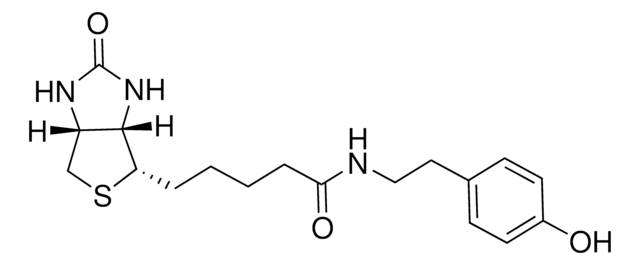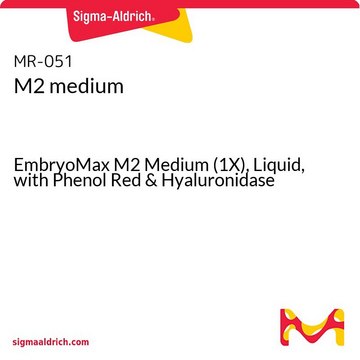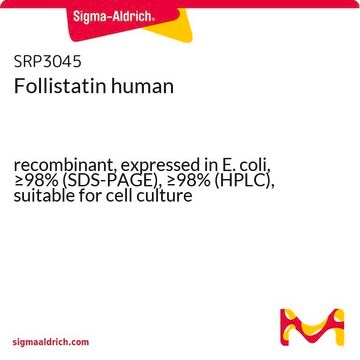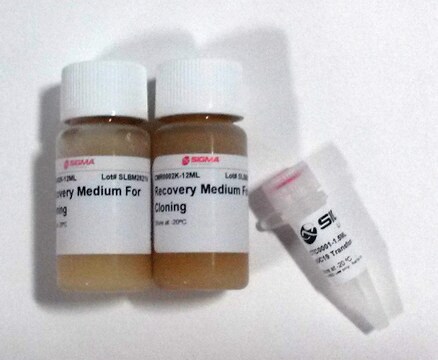F1175
Follistatin 300 human
≥90% (SDS-PAGE), recombinant, expressed in Sf21 cells, lyophilized powder, suitable for cell culture
Sinonimo/i:
FS 300
Autenticatiper visualizzare i prezzi riservati alla tua organizzazione & contrattuali
About This Item
Prodotti consigliati
Origine biologica
human
Livello qualitativo
Ricombinante
expressed in Sf21 cells
Saggio
≥90% (SDS-PAGE)
Stato
lyophilized powder
Potenza
0.1-0.4 mg per mL
PM
31 kDa
Confezionamento
pkg of 25 μg
Condizioni di stoccaggio
avoid repeated freeze/thaw cycles
tecniche
cell culture | mammalian: suitable
Impurezze
endotoxin, tested
N° accesso UniProt
Temperatura di conservazione
−20°C
Informazioni sul gene
human ... FST(10468)
Descrizione generale
FST (follistatin) is an activin-binding protein, and exists in two isoforms due to alternate splicing, FS288 and FS315. It is a glycoprotein with a single chain, and acts as an activin antagonist. It has a high level of expression in fetal membranes and placenta.
Applicazioni
FST (follistatin) has been used for trophoblast fusion assay and the measure of hCG (human chorionic gonadotropin) concentration in hormone assays. It is also suitable for the development of chondrocytes from hESc (human embryonic stem cells) by a new 3-Stage directed differentiation protocol (DDP).
Azioni biochim/fisiol
FST (follistatin) binds to and regulates activins, which in turn are TGF (transforming growth factor)-β superfamily members. The expression level of FST and its binding partner activin A is elevated in inflammatory disorders. The activin A-follistatin system plays an essential role in the modulation of glucose and lipid metabolism, which might have an overall effect on fetal growth. In adipose tissue, it facilitates the adipogenic differentiation of progenitor cells.
High-affinity activin-binding protein that can act as an activin antagonist.
Stato fisico
Lyophilized from a solution in 30% acetonitrile and 0.1% trifluoroacetic acid containing 1.25 mg bovine serum albumin.
Risultati analitici
The biological activity is measured by its ability to neutralize activin-induced bioactivity on K562 cells (erythroid differentiation).
Avvertenze
Danger
Indicazioni di pericolo
Consigli di prudenza
Classi di pericolo
Eye Dam. 1 - Skin Irrit. 2
Codice della classe di stoccaggio
11 - Combustible Solids
Classe di pericolosità dell'acqua (WGK)
WGK 3
Punto d’infiammabilità (°F)
Not applicable
Punto d’infiammabilità (°C)
Not applicable
Scegli una delle versioni più recenti:
Possiedi già questo prodotto?
I documenti relativi ai prodotti acquistati recentemente sono disponibili nell’Archivio dei documenti.
S Iemura et al.
Proceedings of the National Academy of Sciences of the United States of America, 95(16), 9337-9342 (1998-08-05)
In early development of Xenopus laevis, it is known that activities of polypeptide growth factors are negatively regulated by their binding proteins. In this study, follistatin, originally known as an activin-binding protein, was shown to inhibit all aspects of bone
O Hashimoto et al.
The Journal of biological chemistry, 272(21), 13835-13842 (1997-05-23)
There are two types of the activin-binding protein follistatin (FS), FS-288 and FS-315. These result from alternative splicing of mRNA. FS-288 exhibits high affinity for cell-surface heparan sulfate proteoglycans, whereas FS-315 shows low affinity. To understand the physiological role of
Rachel A Oldershaw et al.
StemBook, 2012 Jun 10 (2013-05-10)
We have developed for hESc a new 3-Stage directed differentiation protocol (DDP) to generate chondrocytes, the specialized cells that form cartilage tissue. The protocol is segmented into stages that mimic the developmental processes that occur in cell lineage specification during
Rita Linko et al.
BMC infectious diseases, 14, 253-253 (2014-06-03)
Activin A and its binding protein follistatin (FS) are increased in inflammatory disorders and sepsis. Overexpression of activin A in the lung causes similar histopathological changes as acute respiratory distress syndrome (ARDS). ARDS and severe respiratory failure are complications of
Silvia Näf et al.
PloS one, 9(4), e92175-e92175 (2014-04-26)
The Activin A-Follistatin system has emerged as an important regulator of lipid and glucose metabolism with possible repercussions on fetal growth. To analyze circulating activin A, follistatin and follistatin-like-3 (FSTL3) levels and their relationship with glucose metabolism in pregnant women
Il team dei nostri ricercatori vanta grande esperienza in tutte le aree della ricerca quali Life Science, scienza dei materiali, sintesi chimica, cromatografia, discipline analitiche, ecc..
Contatta l'Assistenza Tecnica.









